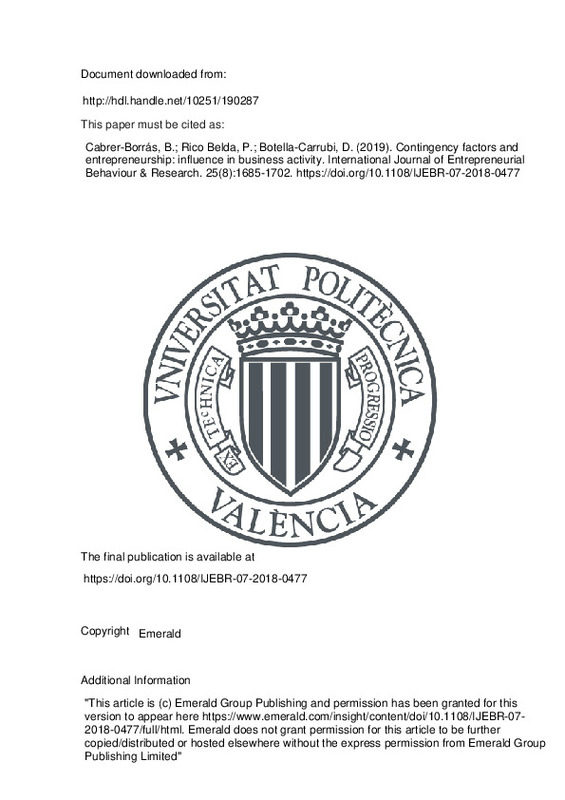JavaScript is disabled for your browser. Some features of this site may not work without it.
Buscar en RiuNet
Listar
Mi cuenta
Estadísticas
Ayuda RiuNet
Admin. UPV
Contingency factors and entrepreneurship: influence in business activity
Mostrar el registro sencillo del ítem
Ficheros en el ítem
| dc.contributor.author | Cabrer-Borrás, Bernardí
|
es_ES |
| dc.contributor.author | Rico Belda, Paz
|
es_ES |
| dc.contributor.author | Botella-Carrubi, Dolores
|
es_ES |
| dc.date.accessioned | 2022-11-28T19:02:05Z | |
| dc.date.available | 2022-11-28T19:02:05Z | |
| dc.date.issued | 2019-11-07 | es_ES |
| dc.identifier.issn | 1355-2554 | es_ES |
| dc.identifier.uri | http://hdl.handle.net/10251/190287 | |
| dc.description | "This article is (c) Emerald Group Publishing and permission has been granted for this version to appear here https://www.emerald.com/insight/content/doi/10.1108/IJEBR-07-2018-0477/full/html. Emerald does not grant permission for this article to be further copied/distributed or hosted elsewhere without the express permission from Emerald Group Publishing Limited" | es_ES |
| dc.description.abstract | [EN] Purpose The purpose of this paper is to analyse the determinants of the survival of Spanish companies. Design/methodology/approach Two approaches are used and they are complementary. The first approach analyses the determinants of survival probability. For this purpose, a binary choice model is built and estimated using a sample of companies from the main economic sectors taken from the SABI database. Likewise, the Blinder-Oaxaca decomposition is applied to quantify the difference between companies with employees and without employees and the proportion of this difference that owes to observed factors or unobserved factors. Finally, the second approach is a survival analysis carried out through the Cox proportional hazard model that identifies the determinants of the duration of business activity. Findings The results of the empirical analysis show that companies without employees present less favourable conditions for survival at all stages of their evolution than companies with employees. Originality/value The contribution of this study to the empirical literature consists in analysing the difference between companies with and without employees. Due to the structure of Spanish companies, this aspect and the determinants of such difference are essential for policymakers to increase the survival for companies. | es_ES |
| dc.language | Inglés | es_ES |
| dc.publisher | Emerald | es_ES |
| dc.relation.ispartof | International Journal of Entrepreneurial Behaviour & Research | es_ES |
| dc.rights | Reserva de todos los derechos | es_ES |
| dc.subject | Entrepreneurship | es_ES |
| dc.subject | Company survival | es_ES |
| dc.subject | Binary choice model | es_ES |
| dc.subject | Blinder¿Oaxaca decomposition | es_ES |
| dc.subject | Cox proportional hazard model | es_ES |
| dc.subject.classification | ORGANIZACION DE EMPRESAS | es_ES |
| dc.title | Contingency factors and entrepreneurship: influence in business activity | es_ES |
| dc.type | Artículo | es_ES |
| dc.identifier.doi | 10.1108/IJEBR-07-2018-0477 | es_ES |
| dc.rights.accessRights | Abierto | es_ES |
| dc.contributor.affiliation | Universitat Politècnica de València. Escuela Técnica Superior de Ingenieros de Telecomunicación - Escola Tècnica Superior d'Enginyers de Telecomunicació | es_ES |
| dc.description.bibliographicCitation | Cabrer-Borrás, B.; Rico Belda, P.; Botella-Carrubi, D. (2019). Contingency factors and entrepreneurship: influence in business activity. International Journal of Entrepreneurial Behaviour & Research. 25(8):1685-1702. https://doi.org/10.1108/IJEBR-07-2018-0477 | es_ES |
| dc.description.accrualMethod | S | es_ES |
| dc.relation.publisherversion | https://doi.org/10.1108/IJEBR-07-2018-0477 | es_ES |
| dc.description.upvformatpinicio | 1685 | es_ES |
| dc.description.upvformatpfin | 1702 | es_ES |
| dc.type.version | info:eu-repo/semantics/publishedVersion | es_ES |
| dc.description.volume | 25 | es_ES |
| dc.description.issue | 8 | es_ES |
| dc.relation.pasarela | S\396956 | es_ES |







![[Cerrado]](/themes/UPV/images/candado.png)

